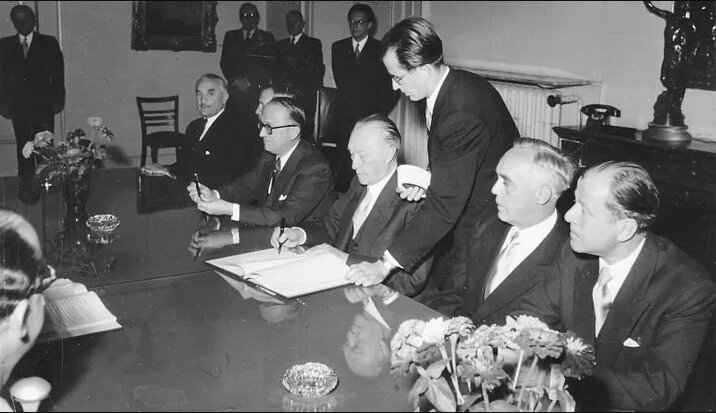Tehran-Israel’s relations with Germany are undoubtedly one of the most complicated and historic diplomatic relations of the 20th century. Rising from the ashes of the Holocaust, this relationship evolved from deep hostility and trauma into a careful and practical engagement, leading to the groundbreaking Luxembourg agreement of 1952.
It refers to reparations for Holocaust survivors and was one of many historic events that changed the bilateral connection between the newly established regime and Israel as the Federal Republic of Germany (West Germany).
The establishment of Israel in 1948 on Palestine lands just three years after the end of World War II was influenced by the Holocaust. Israel was designed to be a safe for the Jews. This is a response to persecution centuries ago, when they found their peak and most frightening manifestations at the hands of Nazi executioners.
By the postwar period, it was the most unimaginable for Jews, including the young preliminary leader of the Israeli regime, including reconciliation with Germany or any form of involvement. The wound was so fresh and the pain was too fresh.
However, the high demands of the young regime and the harsh reality of the geopolitical situation quickly forced Israeli leaders to close the gap and consider their unthinkable relationship with West Germany.
Early Years: Unwillingness and Practicality
From the late 1940s to the early 1950s, the global landscape was characterized by the Cold War. West Germany’s Prime Minister, Conrad Adenauer, tried to rehabilitate the German image and reintegrate the country into the Western bloc. Adenauer recognized that dealing with the crimes of the Nazi regime was inevitable for German moral and political rehabilitation.
Meanwhile, Israel struggled to absorb millions of Jews from Europe and Western Asia, but its economy faced many challenges. As the administration is under heavy economic tensions, almost all of its budgets were spent on infrastructure building and housing for its citizens.
Despite the urgent needs, accepting reparations from Germany has been highly controversial in many Israeli circles. Most Holocaust survivors and citizens felt that their involvement with Germany was to betray the victims. The Israeli masses split, and a fierce debate broke out over the moral meaning of accepting “blood money.” Menachem Begin, head of Herut Party, was one of the opponents of the idea, and passionately argued that it exempts the Germans from their moral responsibility.
However, Israeli Prime Minister David Ben Gurion and his government took a practical approach. Ben Gullion did not consider compensation to be forgiven, but he thought it was justice and compensation. He argued that Germany had a moral obligation to compensate the Jews for the immeasurable suffering and losses they had inflicted on them. Furthermore, financial support from Germany could play an important role in Israel’s development and survival.
The road to the Luxembourg agreement
The relations between Israel and West Germany during negotiations were tense and complicated. They were indirect negotiations primarily mediated by the Conference of Claims, an organization representing Jewish Holocaust survivors.
The geopolitical context, especially the Cold War, also influenced negotiations. The US was supporting the reparation process to further integrate West Germany as a breakwater against Soviet expansion.
In 1951, Israeli Foreign Minister Moshe Charett officially presented the four German Allied forces with a claim for compensation. The claim called for compensation for material losses suffered by Jews during the Holocaust and costs incurred in resettlement of occupied Palestinian Holocaust survivors.
Under Adenauer’s leadership, the West German government was then willing to acknowledge its responsibility and negotiate it.
The culmination of the negotiations was the signing of the Luxembourg Agreement on September 10, 1952. West Germany has agreed to pay the German mark of $3 billion in goods or services to the German mark of $3 billion over the next 12 years. Additionally, 450 million German marks have been paid to the billing meeting for the benefit of non-Israel Holocaust survivors.
The importance of the Luxembourg Agreement
The Luxembourg Agreement marked a very important historic milestone in Israeli-German relations. This was Germany’s accountability for the Holocaust and its promise to pay compensation.
For Israel, the very existence of this agreement was a lifeline that provided the administration with the financial resources to build the economy and infrastructure. The money paid was dedicated to developing the fundamental areas of housing, transportation and industry that were sought to absorb the influx of immigrants and form the Israeli foundation for future development.
This agreement proved to be highly controversial. It even led to fierce public debate and violent protests in Israel over the acceptance of compensation.
This issue was serious for many Holocaust survivors and their offspring. They felt that the loss of life and the trauma was not enough to compensate for the loss of life that had suffered. It raised difficult questions about what exactly justice means, and how far material reparations can go in the face of suffering beyond imagination.
For Germany, the Luxembourg Agreement was a crucial step in postwar rehabilitation. Through their sense of responsibility and payment of compensation, West Germany was trying to convey this impression to the global community that it had decided to atone for the crimes committed against the victims of the Nazi regime.
The agreement helped Germany return to an acceptable rank in the global community, ultimately leading to its entry into NATO and the European Economic Community.
Indeed, this legacy marked the beginning of the gradual normalization of Israeli-West Germany relations. It carried both countries through a highly complex and rich network of relations about trade, technology and security cooperation over the next decades. However, the shadow of the Holocaust continued to loom large, shaping the dynamics of their interaction.
A few years after that agreement, Germany has never deviated from its commitment to confront historical responsibility. He provided continued support to Holocaust survivors, funded education initiatives, and worked to maintain Holocaust memories.
For Israel, relations with Germany have evolved into a strategic partnership despite being sensitive to historical context.

